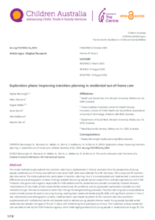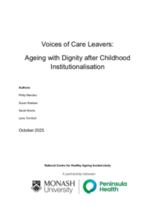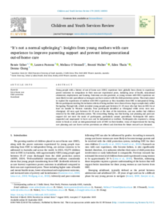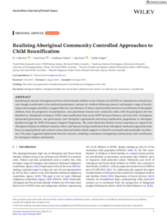

Displaying 11 - 20 of 677
This mixed-methods study examined transition planning in Victoria, Australia, from the perspectives of young people, residential out-of-home care staff, and cross-sector workers, revealing that while multiple organizations support youth—particularly Child Protection and residential care providers—responsibilities and participation methods vary, with young people often involved indirectly rather than through formal goal-setting.
This report explores how childhood institutional care negatively shapes health, well‑being, housing, and social outcomes well into older adulthood for people now aged 50 and above in Australia. It argues for a shift away from institutional aged care and towards trauma‑informed, person‑centered home or community care — designed with and for care leavers — to uphold dignity and improve long-term quality of life.
This study explored the experiences of 11 young mothers in Western Australia with out-of-home care (OHC) backgrounds, highlighting that leaving care planning and post-care support often failed to meet their needs, particularly around parenting. Participants felt underprepared and under-supported, but expressed determination to break cycles of OHC, pointing to the need for improved services and future research.
The article reports that New Zealand has temporarily suspended recognition of many international adoptions — especially those from Samoa — citing concerns over cases of abuse after children adopted overseas arrived in New Zealand.
A recent Queensland Family and Child Commission report warns that the state's over-reliance on residential care has driven costs from around AUD 200 million in 2015 to AUD 1.12 billion in 2024, and without systemic reform, expenses could skyrocket to as much as AUD 7 billion annually by 2030.
This article examines why reunification rates for Aboriginal and Torres Strait Islander children in out-of-home care in New South Wales, Australia remain so low, despite being the preferred permanency option. Drawing on insights from practitioners, it highlights the need for culturally grounded approaches and a redefinition of reunification that centers ongoing family and community connections.
This study explores how trust is built within the Mockingbird Family foster care model in Australia, based on interviews with children, carers, and care networks. Findings show that trust emerges through daily interactions, collaboration, and organizational and political support, rather than being a fixed trait. The study highlights the importance of relationship-centered, interconnected approaches to reimagining foster care.
"Ordinary People, Extraordinary Hearts" is an on-demand training program designed to support kinship carers in Australia in creating safe, nurturing, and healing environments for children and young people in their care.
In the Solomon Islands, a whole-of-nation approach has been launched to tackle escalating child protection challenges through the Child and Family Welfare System Multi-Sectoral Implementation Plan (2025–2030).
This study explores how caseworkers in Australia’s out-of-home care system balance children’s right to participate in decisions with concerns about risk and trauma. Findings show that while participation is valued, caseworkers often limit or delay it due to fears of destabilizing placements or harming children’s wellbeing, highlighting the need for more reflexive approaches to strengthen participatory practice.







